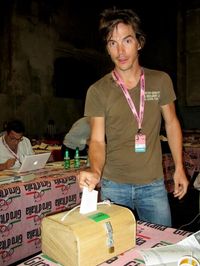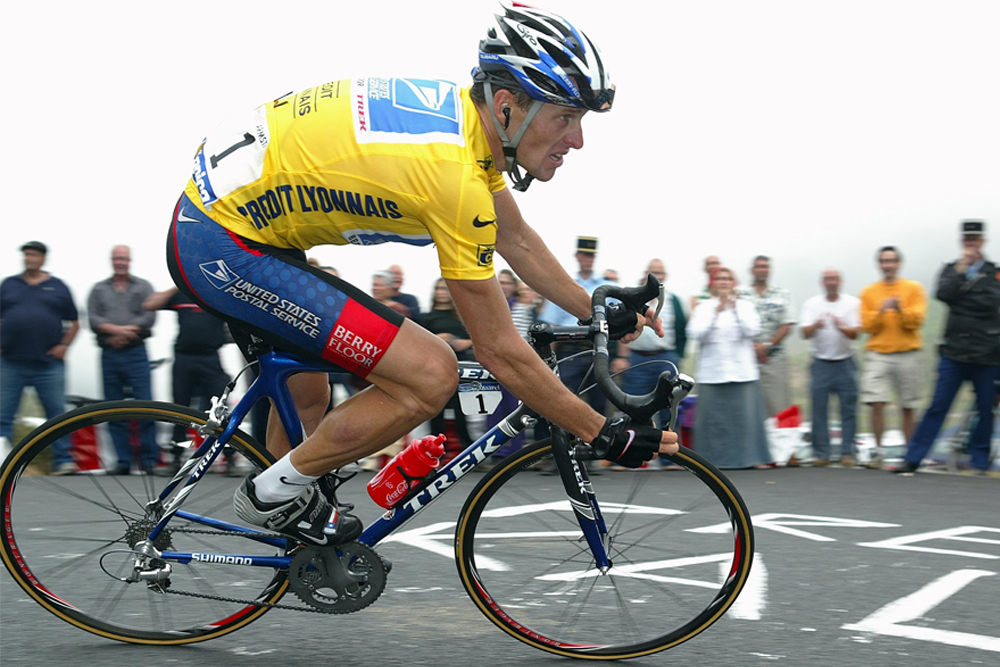Lance Armstrong: 'In 1999 no one even knew you could put a motor in a bike'
In a tense interview on Irish radio, Lance Armstrong laughs off a question about whether he ever used a motor in his bike


Armstrong at the 2003 Tour de France. Photo: Graham Watson
Lance Armstrong laughed off the question of whether he used a motor in his bike when he raced to win the Tour de France, saying at the time no one knew such bikes existed.
The disgraced Texan cyclist spoke at length in a tense Off the Ball interview for Irish radio, which ended with Armstrong hanging up without saying a word. He was asked about topics ranging from Greg LeMond to Paul Kimmage – and of course, motors.
"Absolutely not," he said when asked if doping doctor Michele Ferrari ever offered him a motorised bike.
If he would ever had considered using one, Armstrong said, "of course not."
Host Ger Gilroy asked him what the difference was between using a motorised bike and EPO, which Armstrong confessed to consuming.
"Ger, are you a complete rookie? In 1999, no one even knew you could put a motor [in a bike]. Are you out of your mind?" Armstrong said.
"I know that it's topical. I know there has been a rider caught with a motor in her bike. But, are you crazy?"
The latest race content, interviews, features, reviews and expert buying guides, direct to your inbox!
Ferrari explained in April that "sooner or later" someone will explain how motorised bikes are used in cycling.
"Electric bikes? I tested them, the advantages are obvious," Ferrari said. "They have been used in races since 2005 and some professionals keep them at home to replace the workouts behind motorcycles. No one is interested in looking under the carpet. But sooner or later someone will talk."
It must be said, Armstrong has never been accused of having cheated with a motor, which could explain his incredulity at the line of questioning.
He admitted to doping throughout much of his career with EPO, testosterone, blood transfusions and other banned drugs and methods. Officials stripped him of his seven Tour de France wins from 1999 to 2005 after the US Anti-Doping Agency (USADA) decision in 2012. He says he still keeps the seven yellow jerseys framed on his wall.
>>> Lance Armstrong: If the court case goes the wrong way then we’re out on the street
Irish journalists Paul Kimmage and David Walsh helped play a role in Armstrong's downfall. At a pre-Tour of California, Kimmage famously confronted Armstrong when he was making his comeback. Armstrong said that Kimmage was not worth the chair that he sat on.
"I had one interaction with Paul, that was at the press conference in California. I didn't handle that right. I'm sorry, I was a complete dick," Armstrong added.
"He wants to do an interview. There's a time for he and I to sit down. Truth be told, I don't know Paul Kimmage. It was that one interaction, that I'll fully confess too and cop to that I was out of line."
Armstrong sued Walsh and The Sunday Times and they settled on £300,000 in 2006. After the USADA report, the newspaper sued Armstrong for £1 million and settled out of court for an undisclosed amount.
"David's situation has been settled and it's a confidential matter, I can't comment on that and he can't comment on that. That'd be an interesting podcast [with Walsh], but I don't know that that's going to happen at anytime soon."
The 45-year-old Texan seemed upset at times throughout the interview and went silent for eight seconds after one question. When Gilroy thanked him for his time and the interview, Armstrong hung up without a word spoken.
Armstrong will be in Ireland later this month for the One Zero Conference in Dublin, where he joked that Kimmage should be the one who asks him the questions.
Gregor Brown is an experienced cycling journalist, based in Florence, Italy. He has covered races all over the world for over a decade - following the Giro, Tour de France, and every major race since 2006. His love of cycling began with freestyle and BMX, before the 1998 Tour de France led him to a deep appreciation of the road racing season.
